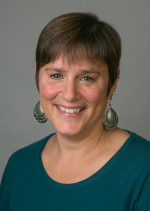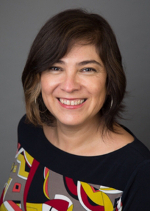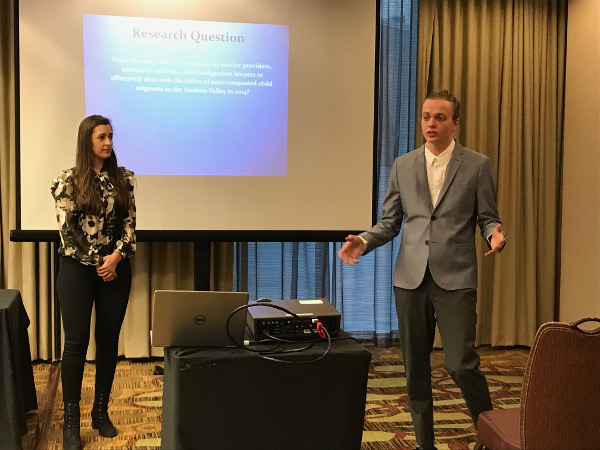Research Team Investigates Hudson Valley’s Response to Humanitarian Crisis
Three years ago, LA&S colleagues Anne R. Roschelle, professor of sociology, and Luz Porras, lecturer of languages, literatures, and cultures, embarked on a journey to understand the mass migration of unaccompanied Central American minors into the United States.

They co-taught a successful course on the subject, led study abroad courses in Guatemala, and, recently, inspired senior Timothy Allan and alumna Elizabeth Greaney ’09 (Spanish, Sociology – Human Services) to join them in investigating a new focus of their inquiry – the Hudson Valley’s humanitarian response to the influx of child migrants from El Salvador, Honduras and Guatemala.
The migration of unaccompanied children from the region known as the Northern Triangle reached its apex in 2014, with the exodus of 51,705 children by the year’s end. U.S. military and economic intervention in the region, civil war, sexual assault, poverty and gang violence have been identified as key push factors, but the responses of community care providers to the crisis have garnered little attention.
The research team highlights these critical perspectives in the new article “Treacherous Crossings, Precarious Arrivals: Responses to the Influx of Unaccompanied Minors in the Hudson Valley,” published in Children and Youth Services Review.

The team conducted 25 qualitative interviews with those on the front-lines of the immigration crisis: teachers, immigration lawyers, service providers and activists.
Those interviewed described fractured social services agencies straining under the burden of a humanitarian crisis they were ill-equipped to address. Agencies that offered support to migrant children were understaffed and geographically isolated, posing significant transportation challenges in the Hudson Valley’s rural areas.
Children released from one of the Hudson Valley’s three shelters for unaccompanied youth often failed to receive necessary medical and mental health care post-reunification, and a dearth of available legal services increased the likelihood of deportation. Other conversations revealed language barriers for Spanish-speaking children and their sponsors in accessing helplines and school enrollment paperwork.
For Roschelle and Porras, the research project was a natural outgrowth of their teaching collaboration and the community volunteer and activist work it inspired. Allan and Greaney brought new insights and experiences to the team.
Greaney, who is pursuing a master’s degree in social work from Adelphi University, works as the assistant director of a local shelter for unaccompanied children funded by the Office of Refugee Resettlement. Greaney and colleagues work to reunify unaccompanied migrant children with their families, who hail from different parts of the country.
Greaney, who was recruited for the team after giving a guest lecture to students in Roschelle’s and Porras’ team-taught course, played a pivotal role in researching immigration policy and connecting the research team to service providers in the field.
“I always love to learn, so to be provided with an opportunity to participate in research that was within my field of passion and expertise at the beginning of my professional development was so exciting to me, and really an honor that they reached out to bring me on the team,” said Greaney.

Allan, a senior in the Sociology Human Services concentration, was a stand-out student in the Spring 2016 “Inequality, Gendered Violence, and Migration in Guatemala” course and companion study abroad course, “Human Rights in Guatemala.” The classroom, study abroad and research experiences introduced him to issues pertaining to migration and human rights, and affirmed his desire to enter the human services field, despite the challenges revealed in the interviews.
Though Allan noted that a “lack of sharing resources within interagency collaboration” is common to the human services field, he commended the service workers, teachers and activists who stepped up to create pamphlets written in Spanish, provide transportation and emergency financial assistance, and organize trainings on immigration policy for area lawyers.
The members of the research team have presented their findings in multiple forums this semester. The team shared their research at the Eastern Sociological Society Conference. Allan had a poster accepted for the New Paltz Student Research Symposium, and Greaney presented the team’s findings at the Adelphi University Research Conference.
This month, Roschelle, Allan and Grenaey organized a staff training for Greaney’s shelter colleagues. “The staff I work with are on the frontlines. They’re speaking with the sponsors, trying to make referrals and work with these families with limited resources, so to give them an image of what’s happening in the community after reunification so close to home and what’s going on in their countries of origin really gave them a new perspective on the work that they do every day,” Greaney said.
Allan said the experience ignited in him a passion for research, which he sees as essential to his work in the field. “I want to use this research to implement in my own work. We’re not just writing it and leaving it in an academic journal. We’re writing it, we’re showing it and using it to implement in services.”
Roschelle said Allan and Greaney brought “insight, enthusiasm, youth, intellectual and critical thinking skills” to a project that allowed them to witness firsthand the challenges experienced by Central American migrants and advocate on their behalf during a time of highly-charged political debates on immigration.
“We call it praxis in sociology. It’s the idea of theory and reality intersected, so whether it’s through human services and advocacy or through activism, it’s really important for all of these things to be informed by research based in empirical evidence, not stereotypes and people’s opinions,” she said.
